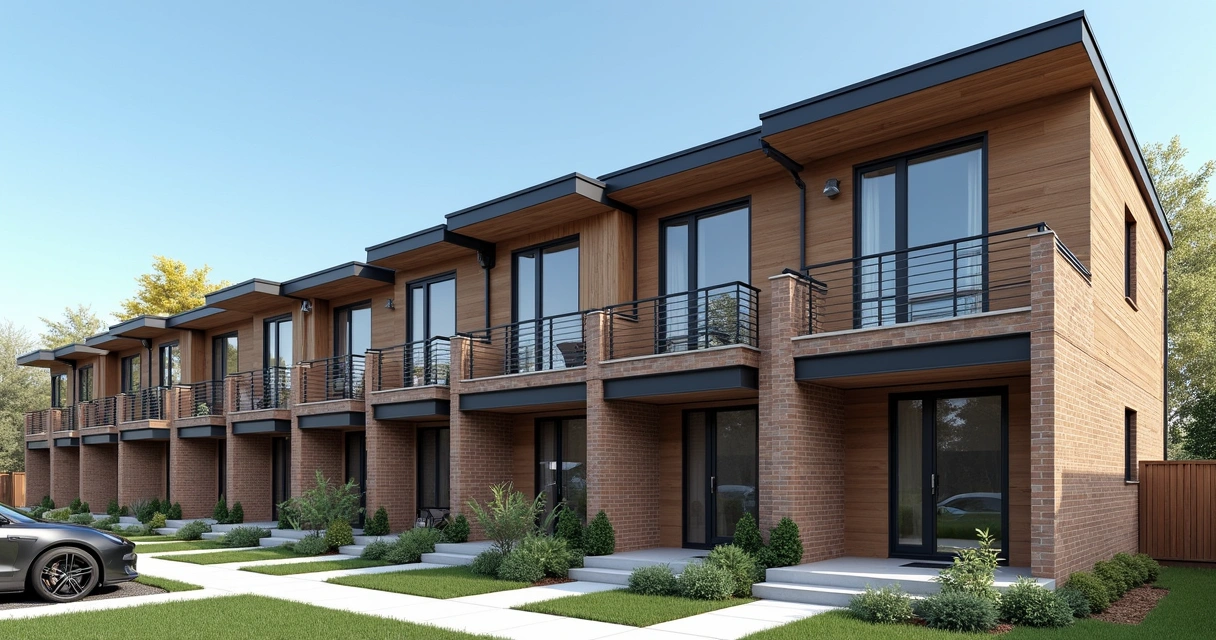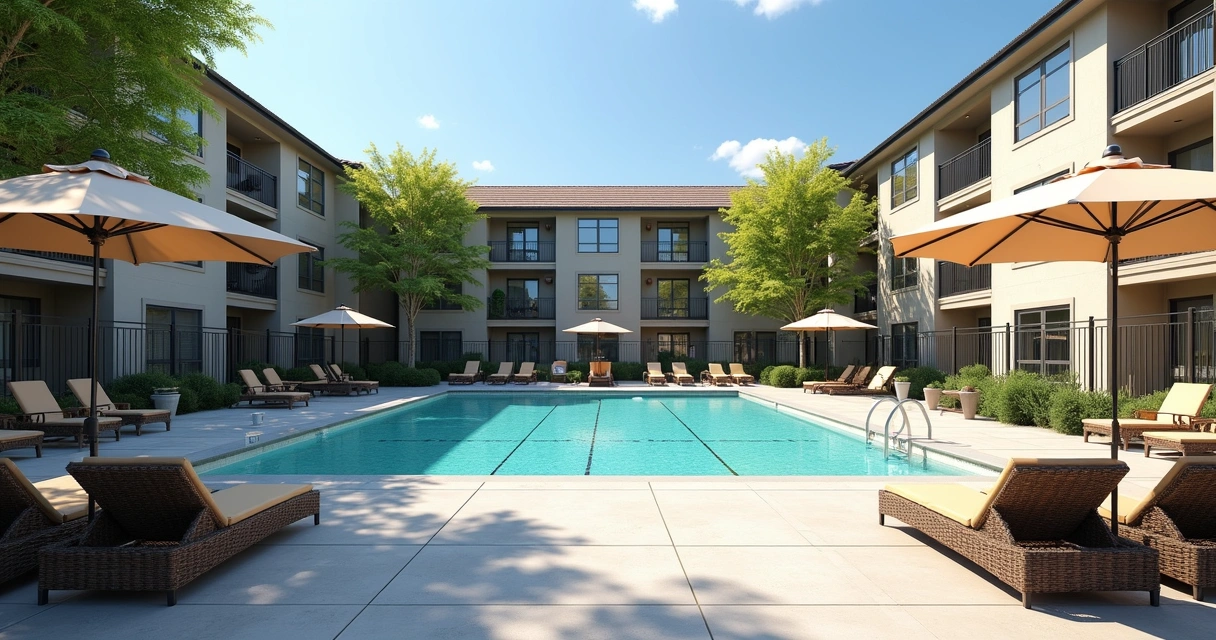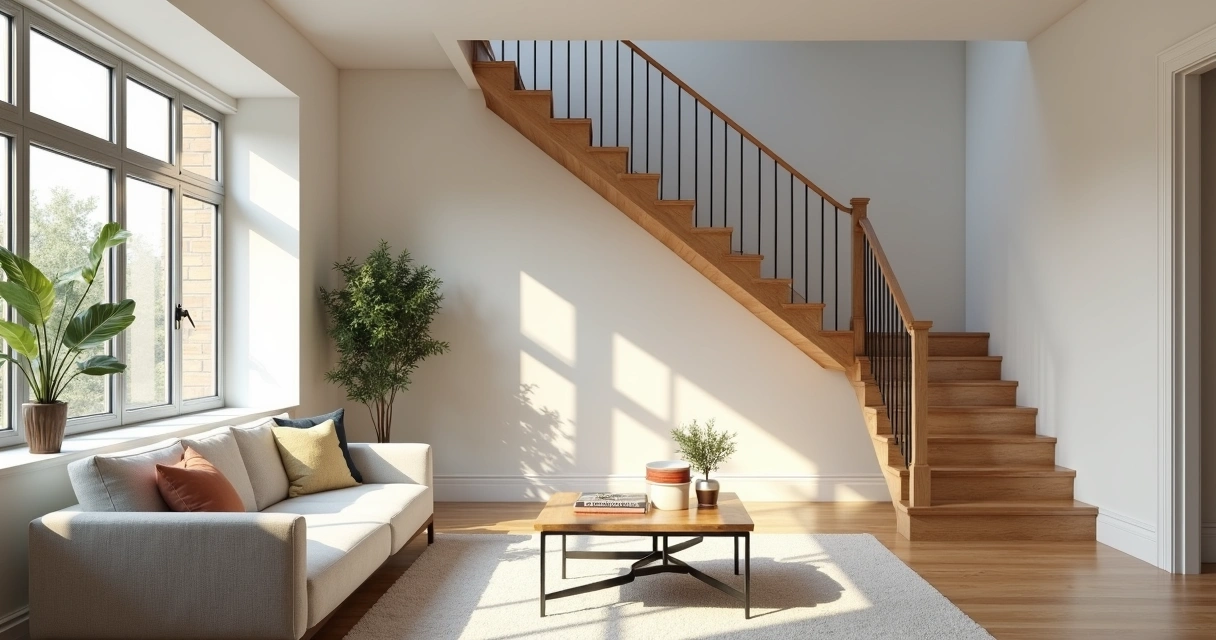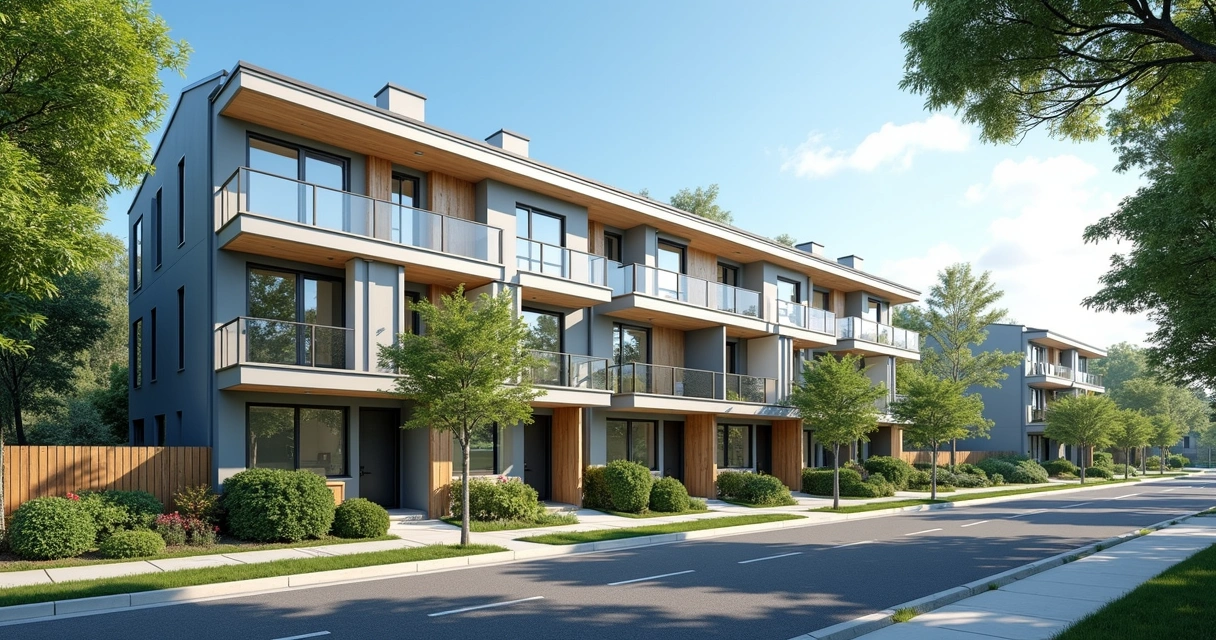The places we choose to live shape how we experience life, day after day. Sometimes the dream is a big house set apart from the world. Sometimes you want simplicity and connection. For many, a townhome lands right in the middle—a mix of independence and shared community. But what is it, really? And is it right for you? That’s what we’ll uncover, step by step.
What is a townhome? design, structure, and what makes it unique
Picture a row of homes, neatly lined up, each with its own front door and maybe even a small patio or patch of grass. These are not stand-alone houses, but they’re not apartments either. A townhome, or townhouse, is designed to give you the feel of a private house while sharing at least one wall with a neighbor.
Some basic features make them easy to spot:
- Multi-level floor plans, often two or three stories
- Private entrances—no shared hallways
- One or two shared walls with neighbors
- On-site parking, sometimes a garage
- Small yard or patio spaces
A townhome stands tall, not wide.
Design often plays with vertical space. Living rooms, kitchens, and perhaps a bathroom sit on the main level. Bedrooms usually live upstairs, with occasional finished basements or extra rooms below. Unlike apartments, you own the structure and (usually) the land beneath it.
Townhomes vs. condos vs. detached houses
Words can be tricky. So can real estate. Let’s clarify the main differences so you don’t mix up a townhome with a condo or a detached house. Each one has its own feel, its own rules, and its own price tag.
Condos
A condo (short for condominium) is typically part of a larger building or complex. You own the interior space of your unit but not the outside walls, roof, or land. Common areas like hallways, pools, and gyms are owned collectively by the association. Sometimes condos might be laid out like townhomes, but the ownership structure is what really sets them apart.
Detached houses
This is the classic single-family home—no shared walls, a private yard, and total ownership of both house and land. You shoulder all maintenance costs yourself and get the benefit of more privacy.

With a townhome, you get to own your slice of a larger building footprint. It’s a tier between full independence and full community living. It appeals to first-time buyers, downsizers, and anyone who wants a little yard but not the full responsibility (or cost) of a detached house.
Pros and cons of owning a townhome
Should you make a townhome your next nest? There’s plenty to like. But, frankly, a few trade-offs come with the territory. Here are the main upsides and honest drawbacks:
Benefits
- Affordability: Usually, townhomes cost less than single-family homes in the same area. Lower purchase prices can mean smaller down payments and less mortgage debt.
- Lower maintenance: While you maintain the inside and sometimes your yard, exterior upkeep (like roofs, siding, and landscaping) is often handled by the homeowners association (HOA).
- Community feel: Shared walls and close neighbors sometimes foster a sense of security, community events, or even friendship, if you’re into that.
- Efficient use of space: Multi-level floor plans maximize living area on modest lots, so you might get more house for less land.
Drawbacks
- Privacy: Shared walls mean you might hear your neighbors (and vice versa). There can be less personal outdoor space and, well, a few more eyes on you.
- HOA fees and rules: Homeowners associations can limit your freedom with guidelines on everything from paint color to pet ownership. Fees can add up, sometimes unexpectedly.
- Limited land ownership: You typically own the ground directly under your unit, but there’s no sprawling backyard or room to expand.
- Resale and appreciation: In some markets, townhomes appreciate more slowly than detached homes, especially if there are many similar units nearby. But that's not always true. In some fast-growing areas, they keep pace.
A townhome feels less like an island, more like a village.
Sometimes the trade-off fits your stage in life. Less mowing, but maybe a neighbor’s music on a Saturday afternoon. Lower entry price, but a monthly HOA bill. For plenty of buyers, it’s the right mix.
The real costs behind townhome living
Owning real estate always means more than just the mortgage payment. Things like taxes, insurance, and regular dues all affect your real spending. If you’re weighing a townhome versus other home choices, it helps to look at the real numbers before making a leap.
Mortgage payments and down payments
Because townhomes are typically less expensive than traditional houses in popular areas, the upfront costs can be more manageable. Your down payment—usually anywhere from 3% to 20% depending on your loan type—relates directly to the sale price. Monthly principal and interest work out a bit lower, too, assuming all else is equal.
It isn’t always simple, though. Some mortgage lenders treat townhomes similarly to single-family homes if you own the land underneath. Others may look closer at the HOA’s structure and rules. If you’re considering non-traditional financing, or you don’t fit the cookie-cutter borrower profile, you’ll want experts who know how to help. For example, Heart Mortgage guides borrowers who might have unique financial situations or are buying in the US from abroad. They help smooth over confusion.
Property taxes
Your county or city assesses taxes based on the property’s value. While townhomes carry a land component, the lots tend to be smaller, so your tax bill is usually lower than it would be for a detached home of similar size. Still, rates vary. Some cities charge the same rates for all types of residential property—others offer a break for less square footage or shared walls.
Insurance
Protection for your building and belongings is still a must. Townhome insurance costs often land somewhere between those for condos and single-family homes. You’ll need coverage for your place, your personal property, and liability. If your HOA provides a “master policy” for exterior or shared areas, your coverage might be reduced a bit—but you still need an individual policy. It’s worth checking what, exactly, is covered.
HOA fees: what do you pay for?
The homeowners association is a big piece of townhome life. HOAs collect monthly or yearly dues to cover shared services. These might include:
- Exterior maintenance (roofs, painting, siding)
- Landscaping and snow removal
- Community amenities (pools, parks, gyms)
- Security, gates, or patrols
- Trash collection and pest control
- Building insurance for shared areas
HOA fees range from less than $100 to several hundred dollars per month, depending on services and location. Be sure to read the fine print. A low monthly fee sounds good at first, but special assessments for big repairs can be sudden and costly.

HOA fees buy you services, but also some rules.
When figuring costs, don’t just compare mortgage payments. Use a rent vs. buy calculator to see the total picture, including taxes, HOAs, and insurance.
Financing your townhome: how mortgages work
Getting a loan for a townhome is often similar to buying a stand-alone house, especially if the townhome is legally a “single-family home” and you own both the unit and the land underneath. However, there are a few twists to know about.
Types of loans available
- Conventional loans: The most common, available to many buyers, with various down payment amounts. Good credit usually needed. Learn more about conventional mortgages.
- FHA loans: Designed for lower down payments and more flexible credit criteria.
- VA loans: For eligible veterans and military members, offering no-down-payment options.
- Specialty or portfolio loans: Some lenders (like Heart Mortgage) work with investors, foreign buyers, or people who don’t fit a standard mold.
The best loan is one you can afford now—and later.
Lenders will check your credit, income, job history, debt, and the townhome association’s strength. If you’re self-employed, an investor, or buying as a non-resident, some extra steps may be needed. This is where patience, good paperwork, and the right advice pays off. If you’d like a thorough overview, you might check out a complete mortgage guide for homebuyers at the Heart Mortgage blog.
Special considerations for non-traditional buyers
Some people face added hurdles—maybe your income is non-traditional, your credit history is short, or you’re trying to buy in the US from abroad. This is exactly when a company focusing on creative financing or on-person support, like Heart Mortgage, can open up possibilities. Their experience with special cases means that clients who once felt blocked by big banks can move ahead.
One story stands out: a young professional, new to the country and working remotely, wanted to buy into a vibrant urban townhome development. Banks said no, but with custom paperwork and some extra patience, everything worked out in the end. Not every lender takes that personal approach, so ask early who’s comfortable guiding unique cases.
Choosing the right place: how to assess location, amenities, and community
You’ve got your list of wants—now it’s time to match it with reality. Buying a townhome isn’t just about floor plans and price per square foot. The neighborhood, amenities, and community culture can matter as much (sometimes more) than the house itself. You don’t want to move in, then realize the dog park doesn’t allow, well, dogs.
Neighborhood and location
- Commute and transportation: How easy is it to get to work, shops, or parks?
- Safety: Check online maps for crime data, but also visit the area at different times of day.
- Schools: Even if you don’t have kids, good schools often keep property values stronger.
- Noise and traffic: A lively neighborhood is fun, but busy streets might mean more noise than you expect.
Amenities and community feel
Does the development have features that fit your lifestyle? Some townhome communities offer pools, workout rooms, playgrounds, or walking trails. Some focus on green spaces, others on urban convenience. HOA newsletters or websites (if you can find one) offer clues about events, rules, and the overall vibe.
The best fit is more about feeling than features.

HOA rules and long-term plans
Before you commit, read through the HOA documents with care. Are there strict rules on rentals, paint colors, or parking? Are they saving for big repairs or will you face sudden assessments? A strong HOA keeps the property looking sharp, but a weak one can lead to trouble.
It helps to talk with current residents if possible. Ask what they love, and what they’d change. Does the board respond to complaints? How’s the noise level? There’s no substitute for candid feedback.
Your step-by-step guide to buying a townhome
Let’s take a breath for a second. The process can seem like a lot, especially if you’re a first-time buyer. But walking through it in pieces can make everything less overwhelming. Here’s a walkthrough from start to finish:
- Figure out your budget.
- Add up your income, savings, and comfort with monthly payments. Don’t forget taxes, insurance, and HOA fees.
- A rent vs buy calculator or a chat with a mortgage specialist helps here.
- Get pre-approved for a mortgage.
- Before you look at homes seriously, a lender will check your finances and issue a “pre-approval letter.” This shows you’re a credible buyer.
- Pre-approval isn’t binding, but gives you a clear shopping range.
- Shop for townhomes.
- Visit neighborhoods, tour examples, and narrow down your wishes: location, amenities, floor plan, condition, and community culture.
- Make an offer.
- Your real estate agent helps you decide on a fair price, based on recent sales and how long the place has been for sale.
- You’ll also specify any needed contingencies—like passing an inspection or securing a loan.
- Navigate the inspection and appraisal.
- After your offer is accepted, you’ll hire a professional inspector to check for major repairs or problems.
- Your lender also requires an official appraisal, confirming the value matches the loan amount.
- Secure financing.
- Your loan officer (hopefully someone who understands townhomes well) finalizes your mortgage paperwork
- This includes reviewing HOA documents, insurance quotes, and financial details.
- Close on the home.
- On closing day, you’ll sign a mountain of paperwork, pay your down payment plus closing costs, and officially get keys.
- Move in and settle up with your HOA.
- Start paying those monthly assessments, meet your neighbors, and enjoy your space!
One step at a time gets you there.
First-time buyers can feel overwhelmed here. That’s normal. There are resources designed to help you, like first-time homebuyer programs through Heart Mortgage, that offer guidance for each stage.
What makes a good mortgage partner for your townhome purchase?
Here’s a thought: the right mortgage partner isn’t just any lender. Especially when considering something as specific as a townhome, you want someone who:
- Knows the ins and outs of townhome ownership and HOAs—there’s a learning curve.
- Understands unique buyer needs, such as non-standard credit, self-employment, or international status.
- Explains things in plain language, with patience for questions.
- Offers clear, competitive rates and flexible program options.
- Remains accessible by phone, online, or in person—whatever works for you.
I think it really helps if the team draws on real experience. With Heart Mortgage, for example, clients get paired with seasoned specialists who guide them from that first inquiry through closing. Their CEO, Lee Dama, is known for keeping things clear and friendly. A good partner also helps you weigh choices, answer HOA-related questions, and anticipate costs after you move in.
Reading trusted homeownership resources is another way to build up confidence, especially if you’re unsure how mortgages, HOAs, or insurance work together.

What does daily life in a townhome feel like?
Townhome living finds its own rhythm. I once spent a summer house-sitting a friend’s three-story townhouse. The mailbox was steps from the door. The sound of a power washer on a Saturday morning meant the association was taking care of the sidewalks. Neighborhood kids rode bikes in tidy circles. My neighbor’s dog barked occasionally, but we traded cookies across balconies.
It’s quieter than an apartment, but more social than a single-family house way out in the suburbs. Holidays brought shared decorations along the row. Some people loved community barbecues—others kept to themselves. The HOA newsletter was sometimes boring, other times surprisingly helpful (especially about trash day!).
While not every townhome community feels the same, there’s usually a sense of order, care, and a shared stake in appearances. You just need to know what matters most to you: more privacy, less yard work, affordability, or a bit of everything balanced together. Some people thrive here, others, maybe not.

If you’re finding yourself drawn to the idea, maybe it’s time to look a little deeper.
Conclusion: is a townhome right for you?
Choosing a place to call your own is an act of hope. Townhouses offer a sensible middle ground—more independence than a condo, less upkeep than a single-family house, often at a lower cost. For people looking to build equity, simplify maintenance, and still have a little yard or garage to call their own, this option has real appeal.
There are always pros and cons. Costs include not just the loan, but taxes, insurance, and HOA fees. Privacy can vary, and the success of your experience can depend on both your neighbors and the strength of your HOA. Financing is usually straightforward, but unique situations or credit can call for a specialist. Your lifestyle should fit both the home and its community, not just your budget.
Where you live can change your life—choose thoughtfully.
If you’re curious about whether a townhome is your next home, Heart Mortgage is here to help you navigate every step, from comparing costs to picking the loan that fits your life—no matter how straightforward or unique your needs might be. Discover more resources or start your journey with us at Heart Mortgage today.
Frequently Asked Questions
What is a townhome?
A townhome is a multi-story residential property that shares at least one wall with a neighboring unit. Each home usually has its own private entrance, sometimes a small yard or patio, and in many cases, you own both the structure and the land directly beneath it. Unlike condos, where you typically own just the inside, townhomes give more of a single-family home feeling but in a more community-oriented setting.
How much does a townhome cost?
The price of a townhome varies widely based on location, size, age, and amenities. In suburban areas, starters may run from $200,000 to $400,000, while high-end or urban units can reach $1 million or more. On top of the purchase price, remember to include HOA fees, property taxes, and insurance when budgeting your total monthly costs.
Is it worth it to buy a townhome?
It can be a great choice. Townhomes can be more affordable than detached homes, with reduced exterior maintenance and extra amenities through the HOA. They suit first-time buyers, downsizers, or anyone valuing community and convenience but wanting some private space. Like every property, you’ll want to compare all the real costs and benefits to see if it fits your needs and lifestyle.
What are typical townhome ownership fees?
Besides your mortgage, you’ll usually pay homeowners association (HOA) dues, which can range from under $100 to several hundred dollars per month. These fees cover exterior repairs, landscaping, amenities, and sometimes some utilities or insurance. You’ll also need separate homeowners insurance and pay property taxes based on your share of land and building value.
How is a townhome different from a condo?
The main difference is what you own. In a townhome, you own the unit and sometimes the land beneath it. In a condo, you only own the space within your walls—the exterior and common grounds are owned collectively through the association. Townhomes usually have private entrances and sometimes a small yard, offering more independence and less reliance on shared spaces than most condos.





